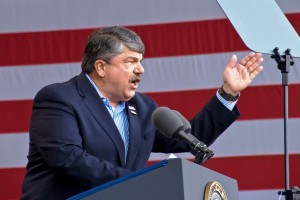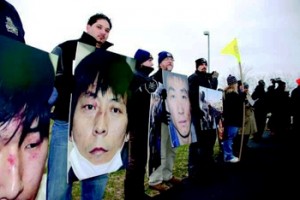
The posturing underlines a fundamental split and a strategic weakness as union membership declines in the U.S. If unions can’t stand together, who will defend their members?
In a late Friday afternoon e-mail to its members and supporters, the United Auto Workers Union defended its endorsement of the revised and still controversial Korean FTA or so called Free Trade Agreement.
The defense came after the heads of U.S. trade unions met privately Friday with President Obama, who was apparently trying to ease tensions over what critics still call a sellout of American workers for narrow global auto industry interests and an ongoing attack on the dwindling American middle class by international corporations.
The organized labor leaders meeting with President Obama at the White House included AFL-CIO President Richard Trumka, United Food and Commercial Workers President Joe Hansen, United Steelworkers President Leo Gerard and United Auto Workers President Bob King, among others.
King stands alone among union heads by favoring the Korean FTA, an agreement that the President and UAW previously vehemently opposed.
In the UAW statement it said, “For the first time ever, the UAW was consulted and played a meaningful role in the negotiations and was able to successfully influence the process and secure significant improvements to the automotive provisions in the trade agreement.” (See Korean Free Trade Agreement gets UAW, Ford Support)
AFL-CIO President Richard Trumka’s concerns about the Korean FTA are much larger than the automobile business, reflecting a more diverse AFL-CIO membership. He said it is about “a more fundamental question about what a fairer and more balanced trade policy should look like.”
Trumka ducked questions after the Obama meeting about what was said, and praised the beleaguered President for his support of labor. However, Trumka previously called for a complete overhaul of U.S. trade policy. (See AFL-CIO Rejects Korean FTA. New Trade Policy Called For)
With the Republicans – openly hostile to organized labor – coming into power in the U.S. House of Representatives and apparently able to block any legislation in the Senate during the next Congress, unions have little choice but to tread lightly and work behind the scenes. It seems likely that the Korean FTA will pass next year in spite of the opposition.
Whether the Republicans have any ideas – other than simply opposing the Democrats – that will create jobs, a key union issue, remains to be seen.
The posturing underlines a fundamental split in organized labor and a strategic weakness as union membership declines in the U.S. If unions can’t stand together, who will defend them?
U.S. unemployment officially rose to 9.8% in November, as even jobs in the retail sector declined with the holiday shopping season under way. (See U.S. Unemployment Rises to 9.8% in November)


